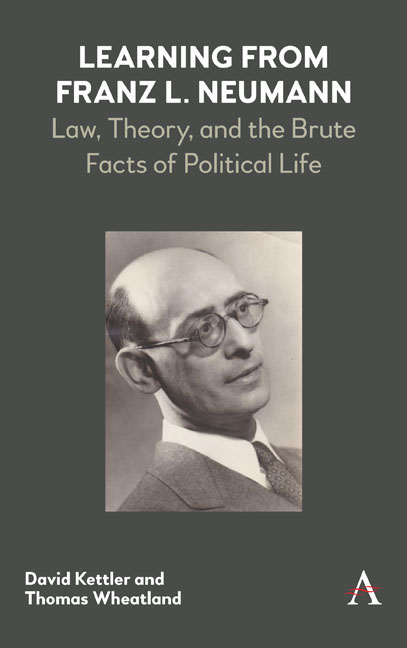Book contents
- Frontmatter
- Contents
- Chapter 1 The Challenge of Franz L. Neumann
- Chapter 2 Social Constitution, Social Power and Responsibility: Neumann and Labor Advocacy
- Chapter 3 Power, Resistance and Constitutions
- Chapter 4 Franz Neumann's Commemoration of Exile
- Chapter 5 After Weimar: The First Exile
- Chapter 6 Neumann's Second Exile: Negotiating the Politics of Research
- Chapter 7 No Happy End: Unprofitable Negotiations
- Chapter 8 Behemoth: Wars Can Be Lost
- Chapter 9 Franz Neumann in Washington: The Political Intellectual at War
- Chapter 10 Franz Neumann in the University: La guerre est finie
- Chapter 11 The Legacy: Four Studies
- Conclusion
- Index
Chapter 4 - Franz Neumann's Commemoration of Exile
Published online by Cambridge University Press: 06 September 2019
- Frontmatter
- Contents
- Chapter 1 The Challenge of Franz L. Neumann
- Chapter 2 Social Constitution, Social Power and Responsibility: Neumann and Labor Advocacy
- Chapter 3 Power, Resistance and Constitutions
- Chapter 4 Franz Neumann's Commemoration of Exile
- Chapter 5 After Weimar: The First Exile
- Chapter 6 Neumann's Second Exile: Negotiating the Politics of Research
- Chapter 7 No Happy End: Unprofitable Negotiations
- Chapter 8 Behemoth: Wars Can Be Lost
- Chapter 9 Franz Neumann in Washington: The Political Intellectual at War
- Chapter 10 Franz Neumann in the University: La guerre est finie
- Chapter 11 The Legacy: Four Studies
- Conclusion
- Index
Summary
Neumann's departure from Berlin in 1933 was by no means the end of his engagement in the overwhelming events of his time. After four years in England, his exile took him to the United States, where he lived until his death by road accident in 1954. To characterize this period, we shall draw on Neumann's own retrospective view, written a year or so before his death and expressly designed to put more emphasis on his American years than on the initial stay in Britain. Still, at this critical break in Neumann's unfinished project, we shall follow him regarding the rise of Hitler to power as a pivotal moment that sharply bisects his intellectual life, although we will take distance from his dismissive view of the earlier period as nothing but prelude. These distortions will require some attention, but in a retrospective examination of the role of social scientists exiled from Nazi Germany written not long before his premature death, Neumann himself proposes a characterization of his own vocation that lets us think less disjointedly about him than is usually done, without reducing his path to a mere artifact of his unique biography. Neumann's occasional piece, a contribution to a collection that was oddly entitled The Cultural Migration by its American editor— as if the persons under discussion were suddenly all struck by wanderlust in 1933— is also a good introduction to his late intellectual style; and we shall therefore review it in some detail, with occasional comments to mark distinctive features of his way of proceeding.
The key concept that Neumann uses for his own kind, accordingly, is “political scholars,” deliberately conflating the senses of the scholar who studies politics and the scholar who is political. Using a more generic term, Neumann defines political scholars, first, as “those intellectuals dealing with problems of state and society— historians, sociologists, psychologists, political scientists— who were— or should have been— compelled to deal with the brute facts of politics”; and, second, as intellectuals who “being political […] fought— or should have fought— actively for a better, more decent political system.” Neumann's explication of this concept— at once normative and descriptive— is a prime motif in his historical approach to the problem of intellectuals in exile, which he offers as context for a consideration of his own cohort of emigrants.
- Type
- Chapter
- Information
- Learning from Franz L. NeumannLaw, Theory, and the Brute Facts of Political Life, pp. 83 - 94Publisher: Anthem PressPrint publication year: 2019



